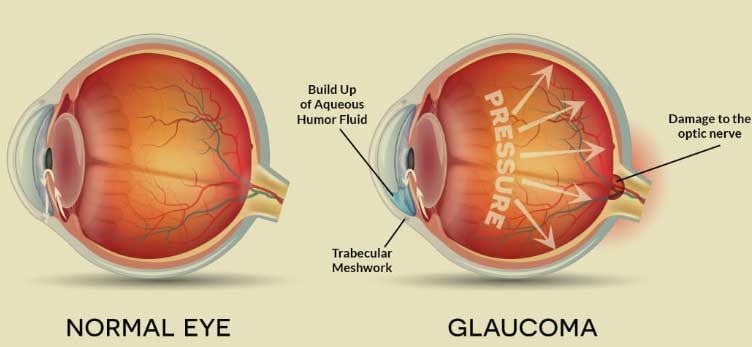GLAUCOMA TREATMENT AND SURGERY IN KOLKATA BY TOP GLAUCOMA SPECIALISTS
Glaucoma earned the nickname "sneak thief of sight" due to its painless, symptomless nature and its irreversibility. As a result, individuals with glaucoma often remain unaware of their condition until significant loss of vision has already occurred. Astonishingly, half of those affected by glaucoma are unaware of their damage. Unfortunately, current treatments cannot restore the damage caused by glaucoma, and complete nerve damage leads to blindness. Consequently, early detection and consistent treatment are crucial in preventing optic nerve damage and the resulting blindness from glaucoma.

CAUSES & TYPES OF GLAUCOMA
Glaucoma can also be broadly categorized into two different types:
- Primary Open Angle Glaucoma: This is the most common type of glaucoma, and its exact cause is not fully understood. However, it is believed to occur due to a combination of genetic predisposition and certain risk factors such as age, ethnicity (African, Hispanic, and Asian descent), family history of glaucoma, and certain medical conditions like diabetes, high blood pressure, and heart disease.
- Angle-closure glaucoma: Angle closure glaucoma refers to an acute attack caused by a sudden blockage of the drainage channels in the eye. This blockage leads to a rapid increase in intraocular pressure, resulting in various symptoms. These symptoms may include blurred vision, severe eye pain, nausea and vomiting, headache, seeing rainbow-like halos around lights, experiencing eye pain after watching TV or leaving a dark theater, and red eyes.
- Low-Tension or Normal-Tension Glaucoma: This form of glaucoma is characterized by optic nerve damage despite relatively normal intraocular pressure (IOP). In some individuals, slowing down the progression of the disease can be achieved by reducing eye pressure by at least 30% through the use of medications. Conducting a thorough medical history is crucial to identify potential risk factors, such as low blood pressure, that contribute to low-tension glaucoma. If no specific risk factors are identified, the treatment options for low-tension glaucoma are similar to those for open-angle glaucoma.
- Congenital Glaucoma: Congenital glaucoma occurs in children who are born with a defect in the angle of the eye, resulting in reduced drainage of fluid. These children often exhibit visible symptoms, including cloudiness in the eyes, sensitivity to light, and excessive tearing. For infants, conventional surgery is usually recommended as medications may have unknown effects and pose challenges in administration. The surgical procedure is safe and effective. When performed promptly, children with congenital glaucoma generally have a high likelihood of achieving good vision.
- Secondary Glaucoma Types: These can develop as a complication of other underlying medical conditions. These types of glaucoma may be associated with factors such as eye surgery, advanced cataracts, eye injuries, certain eye tumors, or uveitis (inflammation of the eye). Pigmentary glaucoma occurs when pigment from the iris flakes off and obstructs the drainage meshwork, leading to a slowdown in fluid drainage. Neovascular glaucoma, a more severe form, is linked to diabetes. Glaucoma can also be triggered in some individuals by the use of corticosteroid drugs for the treatment of eye inflammation or other diseases. Treatment options for secondary glaucoma include medications, laser surgery, or conventional surgery, depending on the specific circumstances and requirements of each case.
WHAT IS THE DIFFERENCE BETWEEN GLAUCOMA AND CATARACT?
Glaucoma and cataract are distinct eye conditions that can sometimes be mistaken for one another due to their shared symptom of painless and gradual vision loss. However, it is crucial to differentiate between them as they require different approaches to management and treatment.One fundamental difference lies like vision loss. In glaucoma, the damage to the optic nerve results in a gradual and irreversible loss of peripheral vision. If left untreated, glaucoma can progress to affect central vision and eventually lead to blindness. On the other hand, cataracts cause a progressive decline in vision due to the clouding of the eye's natural lens. However, cataracts do not directly damage the optic nerve or result in blindness if treated.
Moreover, the treatment options for glaucoma and cataracts differ significantly. In glaucoma management, the primary goal is to lower the intraocular pressure (IOP) or tension within the eye. This can be achieved through various approaches such as prescription eye drops, oral medications, laser therapy, or surgical procedures. The aim is to control the IOP and prevent further damage to the optic nerve. Unfortunately, vision loss caused by glaucoma is irreversible, and the focus is on preserving the remaining vision.
In contrast, cataracts can be effectively treated through a common surgical procedure known as phacoemulsification (or "phaco"). During phaco surgery, the clouded natural lens is removed and replaced with an artificial intraocular lens (IOL). This procedure is highly successful and can fully restore vision, providing improved clarity and visual acuity. Cataract surgery is one of the most commonly performed surgeries worldwide and has a high rate of positive outcomes.
WHAT ARE THE CAUSES OF GLAUCOMA?
Glaucoma is primarily caused by an increase in intraocular pressure (IOP) within the eye, which can damage the optic nerve over time. While the exact causes of glaucoma are not fully understood, several factors contribute to its development. These include:- Elevated Intraocular Pressure: Increased fluid pressure inside the eye, known as intraocular pressure, is a significant risk factor for glaucoma. When the fluid production exceeds the drainage capacity of the eye, it leads to a buildup of pressure, which can damage the optic nerve.
- Impaired Drainage: The drainage system of the eye, responsible for maintaining the balance of fluid, can become blocked or inefficient, leading to increased intraocular pressure. This can occur due to structural abnormalities or blockages in the eye's drainage canals or meshwork.
- Family History: Glaucoma tends to run in families, indicating a genetic predisposition to the disease. If you have a close relative with glaucoma, your risk of developing the condition is higher.
- Age: The risk of glaucoma increases with age. While it can occur at any age, older individuals are more susceptible.
- Medical Conditions: Certain medical and conditions, including diabetes, high blood pressure, heart disease, and hypothyroidism, have been associated with an increased risk of glaucoma.
- Eye Trauma: Injuries to the eye, such as blunt trauma or penetrating injuries, can disrupt the eye's drainage system or affect the normal flow of fluid, leading to glaucoma.
- Prolonged Use of Steroid Medications: Long-term and high-dose use of corticosteroid medications, whether in the form of eye drops, oral pills, or inhalers, can increase the risk of glaucoma development.
HOW IS GLAUCOMA DIAGNOSED?
Regular eye examinations conducted by an ophthalmologist play a crucial role in the early detection of glaucoma. These comprehensive and painless examinations encompass various tests to assess the condition of the eyes. Some of the key tests involved in glaucoma detection include:- Applanation Tonometry: This test measures the intraocular pressure (IOP) or tension within the eye. The eye is usually numbed with drops, and a special device is used to measure the pressure.
- Ophthalmoscopy: Ophthalmoscopy involves examining the inside of the eye, particularly the optic nerve. The doctor uses an ophthalmoscope, which has a small light, to magnify and evaluate the shape and color of the optic nerve.
- Perimetry: Perimetry, also known as a visual field test, assesses the patient's visual field by having them focus on a bowl-shaped white area while lights are presented in fixed locations. The patient may indicate when they see the lights, enabling the creation of a visual field map. This test helps detect the typical visual field defects associated with glaucoma.
- Gonioscopy: Gonioscopy is used to determine the type of glaucoma a person has. After numbing the eye's surface with drops, a special contact lens is placed on the eye to examine the eye's drainage system and assess the angle where the iris meets the cornea.
- Retinal Nerve Fiber Analysis/OCT: This method measures the thickness of the nerve fiber layer in the retina. Thinner areas may indicate glaucoma-related damage. The OCT instrument utilizes optical coherence tomography to create images and contour maps of the optic nerve, optic cup, and retinal nerve fiber thickness.
- Pachymetry: Pachymetry measures the thickness of the cornea. Corneal thickness is important as it can influence accurate eye pressure readings. By understanding corneal thickness, doctors can develop an appropriate treatment plan.
Furthermore, laser peripheral iridotomy is a treatment option for acute angle-closure glaucoma. It involves creating a small opening in the peripheral iris using a laser, allowing fluid to flow and relieving the pressure. This procedure is typically performed in the office and takes only a few minutes.
After any glaucoma-related procedures or examinations, the ophthalmologist may prescribe post-operative visits and recommend appropriate medications for anti-inflammatory purposes.
Regular and thorough eye examinations are essential for the early detection and effective management of glaucoma to preserve vision and prevent further damage.
CURE FOR GLAUCOMA IN KOLKATA AT SPECTRA EYE HOSPITAL
Glaucoma, a chronic and progressive condition, requires effective treatment to manage its progression. It is important to note that any vision loss that occurred before the diagnosis of glaucoma cannot be reversed. At Spectra Eye Hospital in Kolkata, a range of treatment options are available for glaucoma, including medication, laser trabeculoplasty, conventional surgery, or a combination of these approaches. While these treatments can help preserve remaining vision, they do not restore vision that has already been lost due to glaucoma.Medication
Medications, such as eye drops or oral pills, are commonly prescribed as an initial treatment for glaucoma. These medications work by reducing the production of fluid in the eye or improving its drainage. It is important to adhere to the prescribed medication regimen, which may involve multiple doses per day. Since glaucoma often does not present noticeable symptoms, it is crucial to consistently use the prescribed drops or pills to effectively control intraocular pressure. Regular and consistent use is essential for optimal management.
Laser Trabeculoplasty
Laser trabeculoplasty is a procedure that helps improve the drainage of fluid from the eye. Your doctor may recommend this treatment at any stage of glaucoma. It is important to note that even after undergoing laser trabeculoplasty, the use of glaucoma medications may still be necessary. The procedure is performed in the doctor's office or an eye clinic. Before the surgery, numbing drops will be applied to your eye. During the procedure, your doctor will use a specialized lens to direct a focused beam of light onto the mesh work inside your eye. The laser creates small burns in the mesh-work, which helps enhance fluid drainage.
Glaucoma Filtering Surgery
Conventional glaucoma surgery involves creating a new pathway for fluid to leave the eye. Your doctor may recommend this treatment if medications and laser surgery have not effectively controlled intraocular pressure. Before the surgery, you will receive medication to help you relax, and small injections will be administered around the eye to numb it. A small piece of tissue will be removed to create a new channel for fluid drainage from the eye. Conventional surgery is typically performed on one eye at a time, with a gap of four to six weeks between operations. This surgical procedure has a success rate of approximately 60 to 80 percent in lowering intraocular pressure.
Minimizing the Risk of Glaucoma: Key Points to Remember
- Regular Follow-Up: Glaucoma detection requires regular follow-up since the condition can cause asymptomatic and irreversible vision loss if untreated or neglected. Schedule routine eye care every 18-24 months if you are aged 39 years or over.
- Increased Frequency: If you have a family member with glaucoma, a history of serious eye injury, or are taking steroid medication (tablets or eye drops), it is important to have an eye check-up every 12 months.
- Monitoring Eye Pressure: For glaucoma patients, the effect of treatment on eye pressure may vary and should be regularly measured by a glaucoma specialist.
- Maintain Records: Keep records of your eye condition to compare during subsequent visits. This allows the doctor to track any changes and adjust treatment accordingly.
- Consult Your Doctor: Never alter or stop your prescribed medication without consulting your doctor. Consistency in treatment is vital for managing glaucoma effectively.
- Additional Testing: Individuals with a family history of glaucoma may undergo a highly sensitive visual field analysis called short-wavelength automated perimetry (SWAP). This test detects early changes in the eye before the optic nerve displays signs of glaucoma.
HERE ARE THE TOP GLAUCOMA SPECIALISTS IN KOLKATA

Dr. Ananyabrata Das
M.B.B.S, DO
- Cataract 12
- Diabetic Retinopathy
- IOL
- Medical Retina
- Age Related Macular Degeneration
- Conjunctivitis
- Cornea
- Dry Eye
- General Ophthalmology
- Glaucoma
- Orbit & Oculoplasty
- Squint & Orthoptics
- Uvea & Ocular Inflammation 12

Dr. Dipangshu Basu Chaudhuri
MBBS, MD, AIIMS
- Cataract 8
- Glaucoma
- Conjunctivitis
- Dry Eye
- General Ophthalmology
- IOL
- Medical Retina
- Neuro - Ophthalmology
- Uvea & Ocular Inflammation 8

Dr. Rituparna De
MBBS, DO, FICO, FMRF
- Cataract 7
- Conjunctivitis
- Dry Eye
- General Ophthalmology
- Glaucoma
- IOL
- Neuro - Ophthalmology
- Uvea & Ocular Inflammation 7

Dr. Satyajit De
MBBS (CAL), DO (CAL)
- Cataract 7
- Conjunctivitis
- Dry Eye
- General Ophthalmology
- Glaucoma
- IOL
- Orbit & Oculoplasty
- Uvea & Ocular Inflammation 7

Dr. Somnath Ghosh
MBBS (CAL), DO (CAL)
- Cataract 6
- Conjunctivitis
- Dry Eye
- General Ophthalmology
- Glaucoma
- IOL
- Uvea & Ocular Inflammation 6

Dr. Sutapa Roy
MBBS, DNB
- Cataract 7
- Conjunctivitis
- Dry Eye
- General Ophthalmology
- Glaucoma
- IOL
- Neuro - Ophthalmology
- Uvea & Ocular Inflammation 7
Frequently Asked Question (FAQs)
- The best glaucoma specialists in Kolkata from Spectra Eye Hospital offer various treatment options, including medical treatment with anti-glaucoma eye drops, laser treatment, and surgical intervention using glaucoma drainage devices. The treatment choice depends on the type and severity of the eye disease.
- Damage caused by glaucoma cannot be reversed, but early detection and appropriate treatment can help slow down or halt the progression of the eye disease. Regular follow-ups with your eye doctor are crucial to managing glaucoma effectively.
